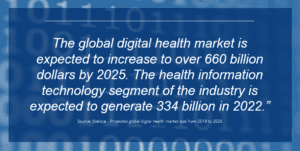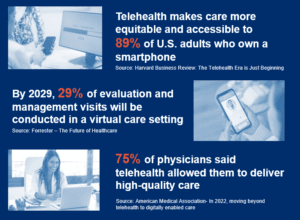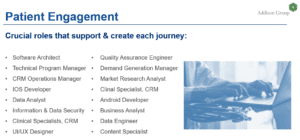It’s safe to say, the telehealth era is just beginning. Until 2020, the standard for every doctor’s office visits, surgeries, prescription pickups, and medical consultations occurred physically in person – all of which became predominately conducted virtually due to the COVID-19 pandemic. The healthcare industry transitioned quickly to a new process in which virtual support and technology were necessary to accelerate telehealth solutions.
Now, what? The industry is finding that a virtual patient experience isn’t fading, but rather it’s here to stay. The first quarter of 2020 alone in the U.S. showed a 154% increase in telehealth visits, and the momentum is only predicted to continue. In April 2021, 64 percent of U.S. broadband households reported using a telehealth service in the previous 12 months, and 43% percent of adults want to continue to use telehealth services after the pandemic. By 2023, the telehealth market is estimated to reach $194.1 billion, and an even more impressive $459.8 billion by 2030. With this growth continuing, developing an extensive team of non-clinical healthcare workers has never been more important in supporting patient care.

As Addison Groups’ SVP of Healthcare, here are some key insights – from why it’s beneficial to patients and organizations, the importance of data security, to steps on how to develop a cohesive team to ensure organizations have a smooth patient experience.
Key Benefits of Telehealth
The proof is in the numbers—68% of patients say it’s important to customize their experience with their healthcare provider, and 60% of patients would prefer to make a digital payment through a portal. However, the benefits for patients run far deeper than meets the eye. The increase in personalized communication as well as accessibility 24/7 to support have shown an increase in patients following prescribed recommendations and attending follow-ups inevitably leading to better health. In an ever-fast pace and technology driven world, having on-demand resources limits transportation time and can significantly expand patient care.

For healthcare providers, the benefits of telehealth go beyond the healthcare organization branding itself as innovative and using cutting-edge technology. Similar to benefits for patients, utilizing telehealth services reduces hospital readmissions as well as no-show rates, as patients have the ability to take appointments from the convenience of their homes. All of these factors tie into bottom-line operational costs, as well as allowing physicians to work remotely and suit the needs and flexibility of the patient.
Importance of Protecting Patient Data
While telehealth provides an abundance of benefits for both parties, that does not come without the due diligence needed to ensure that patient data is protected just as it would be in an in-person visit. Data breaches are the new normal for healthcare. In 2021, 45 million individuals were affected by healthcare attacks, up from 34 million in 2020. The reality is cybersecurity attacks can and do happen, and organizations need to have a proactive strategy to succeed. So how can healthcare providers manage patient data effectively while creating a personalized experience—by implementing a CRM platform.
The benefits include:
- Clinical encrypted data and file storage process for added security to address HIPAA and HiTech regulations.
- Field-level security and audit logging/revision tracking granular controls protecting who views what data.
- Built-in data model for EHR that follows the HL7 FHIR specifications. FHIR standard for receiving and loading data.
- Older HL7 formats/versions, an HL7 broker or enterprise service bus may be used to translate and load HL7 data.
What does that mean for a healthcare organization? Simply put, patients trust healthcare providers to protect their data. It’s generally understood that healthcare organizations must comply with HIPAA and HiTech regulations, ensuring that their organization is acting in accordance with healthcare laws and enforcement. However, CRM takes this a step further by taking antiquated processes off the table by tracking medical records and storing patient data securely while also simultaneously acting in compliance.
How to Build the Right Team to Succeed
Telehealth was both a curveball and an opportunity that healthcare organizations had to pivot to quickly during COVID-19, and, with no signs of letting up in the years ahead, organizations need to develop a strategy to meet this growing trend—securing the right talent should be at the center of that strategy. So, if your organization is considering implementing a CRM system, you’ll need the right roles to lead your team—from Software Architects, to Data Engineers, to Business Analysts, and more. While specialists can assess budgets, create structure in organizing patient data, and track analytics and efficiency, roles like Research Analysts and Quality Assurance Managers can make sure your patients have the optimal telehealth experience through a keen eye and strategical focus.

Your biggest asset is your people. At Addison Group, our people-first approach and expertise in non-clinical healthcare talent can give your organization an edge when it comes to finding the in-demand talent you need to take your telehealth strategy to the next level. Reach out to us today to get started! https://addisongroup.com/talent-resources/



